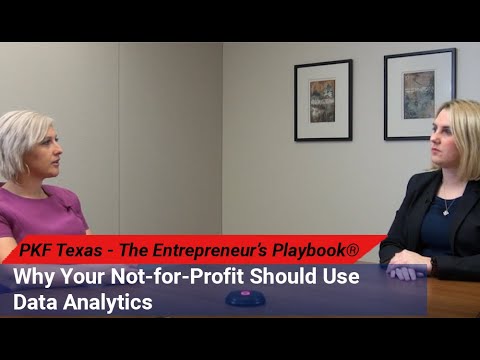Why Your Not-for-Profit Should Use Data Analytics

Jen: This is The PKF Texas – Entrepreneur’s Playbook®. I’m Jen Lemanski, and I’m back again with Nicole Riley, an Audit Director and one of the faces of the PKF Texas not-for-profit team. Nicole, welcome back to the playbook.
Nicole: Hi, good morning.
Jen: Data analytics. You hear that a lot. What are they and how do they impact a not-for-profit organization?
Nicole: Non-profits have a lot of data. They collect information on all the things that they’re doing, and it’s actually said that about 40% of the data isn’t used and for anything. So, there’s a lot of information out there that we can use and develop. And it’s important because those making decisions in the organizations can really use that information to make more–to have more robust information as they are making strategic plans.
Organizations always look at the budget to actual every month, they look at year over year, they get a report from the program people, they get a report from development. So, they’re getting individual reports, but if they use data analytics, they can kind of see how those interplay and see how things are really happening in the organization.
The other thing is validating trends. Like, for instance, if you have a group of counselors and they say, “We’re overwhelmed; we feel overwhelmed,” looking at the analytics of, “What is our salary costs per hour of counseling?” Well, as that continues to decrease, that would validate they’re doing more work, they’re providing more program success with less people, and maybe it’s time to add a person to help alleviate that stress.
So, the analytics can really help solidify the trends that you’re seeing, or the feelings that are happening, or disprove them and say, “No, actually we’re more costly. You guys aren’t doing as much work as you used to, what’s going on?”
Jen: So, what type of metrics should either an Executive Director, CFO, a President… What metrics should they be looking at?
Nicole: You know, I wish there was a set that I could say, you know, do X, Y, Z, but data analytics really requires an organization to look at the information that they have, and the programs that they do and how that all interplays, and you have to really customize the data analytics to make it useful to your organization.
And so, you have to consider, you know, for instance, you wouldn’t use the same analytics and metrics at a food bank as you would a counseling organization. And so, you have to really kind of look at what your organization does and then design it. And unfortunately, it does take a lot of time. You have to kind of sift through the data that you have, get it into usable forms. It’s probably one of the reasons a lot of organizations don’t use data analytics is because of that time crunch. But the good news is we can help.
Jen: Good.
Nicole: Our EAS group does a lot of this stuff and can really help get you set up and put you in the right direction, and then you can utilize it on an ongoing basis.
Jen: That’s perfect. Really helps you make strategic business decisions.
Nicole: Yes, very informed decisions. And the other thing that it can do, it can help identify fraud. It’s not perfect, but it can really identify some red flags that you then follow up on and dig into a little bit more. So, it has that added benefit as well. So, there are so many reasons to invest the time, invest the dollars to get this set up and have your organization set up for success in the future.
Jen: Perfect. Well, we’ll get you back to talk about a few more things impacting not-for-profits. Sound good?
Nicole: That’s excellent.
Jen: For more information about this topic, visit www.pkftexas.com/NotForProfit. This has been another thought leadership production brought to you by PKF Texas – The Entrepreneurs Playbook®. Tune in next week for another chapter.

